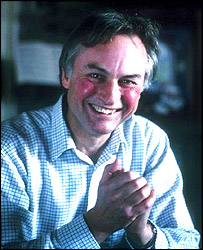
Richard Dawkins is passionate about communicating science
|
Author Richard Dawkins has just topped Prospect Magazine's poll for Britain's top 100 public intellectuals.
The Charles Simonyi Professor of the Public Understanding of Science gained almost double the votes of his nearest rival.
Despite this, Prospect labelled science the "dog that didn't bark", because only three scientists appeared in the top 30.
Here Professor Dawkins tells BBC News Online why the label is not justified.
Why do you think more scientists did not feature at the top of the poll?
Are you sure it is right to say that the science dog didn't bark?
A scientist came top of the voting, and he obtained nearly twice as many votes as the next person. The mean number of votes per person in the entire list of 100 is 42.6.
Eleven scientists were eligible for votes, and the mean number of votes per scientist is 54.5, noticeably above the general average. If you count Jonathan Miller and George Monbiot as scientists (Miller trained as a doctor, Monbiot as a zoologist, and both of them use their science in what they do), the mean number of votes per scientist rises to 62.3.
I haven't done the sums for any other category of person such as journalists or philosophers, but you could, and if you did I think you'd conclude that science put up a respectable growl by comparison.
What sort of mental tool-kit do people need, to think scientifically?
The ability to dream, coupled with the ability to distinguish dreams from reality: creative imagination, coupled with a sceptical respect for the real world.
What is your opinion about how science is covered in the media? How do you think it could be improved?
Science coverage could be improved by the recognition that science is timeless, and therefore science stories should not need to be pegged to an item in the news. It could be improved by the recognition that the usefulness of science is its least important quality.
It could be improved by an understanding of the distinction between science and technology. And it could be improved if more young science graduates were employed by the media (and absolutely no graduates in "media studies").
Do you get tired of being asked about the debate between science and religion - do you think it is time to move on?
We can't move on as long as more than 50% of American voters believe the entire universe began later than the Middle Stone Age, and Tony Blair encourages such teachings in English schools on grounds of "diversity in education".
You have just written a new book, The Ancestor's Tale. What is it about?
It is a history of life going backwards through evolutionary time, in the form of a pilgrimage to the past.
We human pilgrims set off from the present, in a quest for our ancestors. As we go back to the past, we greet other pilgrims from the present, at a series of 39 discrete rendezvous points.
After each rendezvous, one or more of the newly arrived pilgrims has the opportunity to tell a Tale. True to Chaucer's example, each Tale is not about the teller but carries a more general message for life (in Chaucer's case human life, in my case evolutionary life).
The Grasshopper's Tale is about the problem of race, the Galapagos Finch's Tale is about rapid evolution on islands, the Elephant Bird's Tale is about the drifting of the continents, the Rotifer's Tale is about sex...